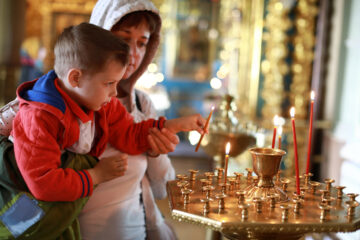The following in an excerpt from “Eros of Orthodoxy,” translated by Fr. Nicholas Palis and written by Mr. Pantelis Paschou.
The music that is chanted in the services of the Orthodox Church is called Byzantine music. It owes its title to the pained but glorious spiritual Byzantium, which bequeathed us art, which is not only a historical phenomenon, but also a valuable and deep form of spiritual civilization, full of the characteristic elements of the life, air and spirit of Byzantium. Before we proceed, we shall have to enclose the bounds of Byzantine music, stressing the basic difference it has from other forms of music. “Byzantine music, says a current Orthodox Bishop, expert and investigator of our ecclesiastical music, is characterized as psalmody. This very suitable word expresses the content and character of Orthodox ecclesiastical songs and distinguishes it from every other religious musical art. Orthodox Byzantine psalmody is strictly an ecclesiastical melody of priestly and liturgical character, separated from areas outside the church, preserved from every profane element and immediately and clearly distinguishable from worldly song. It is an “omoousios” (cosubstantial) birth of Orthodox worship, it was developed with it, just as it was born of the church and grew with it. It came therefore from within and wasn’t affixed externally as an art” (Oikodome” anniversary ecclesiastical and philological, 2nd year 1959 page 177). Thus Byzantine music born in the Church and developed in the spiritual climate of mystagogy, contained in Orthodox worship comprises something sacred for the Orthodox Christian. It is not allowable to think of changing or modernizing it and not even to speak superficially with impiety concerning it, labeling it eastern, Arabic, or “amane” etc. If this seems quite excessive to some, we add this explanation. It is very well known that in Orthodox worship the parts comprising the Church include the faithful. And in this Church our faith, our liturgical life, our journey towards salvation through the Church, is expressed and managed with the help of the divine word, sacred hymnography, ecclesiastical music, Orthodox aghiography, and Byzantine architecture. All of these things are liturgical arts, which on their own don’t affect our salvation, but as uplifting means they help us to purify our senses from earthly things and to ruse spiritually towards meeting Holy God. The liturgical arts are a form of spiritual “sieve” from which our vulgar and bodily senses become spiritual, they are sanctified and become worthy to taste the mysteries of our Orthodox Church. And with our eyes (Orthodox Byzantine aghiography), our ears (tropars of hymnography-Byzantine music) and even with our sense of smell (myrrh, incense, pure wax) the Orthodox Christian feels with his “sanctified” spiritual senses a pull towards the lofty. Where he prays, with “purified” mind and heart, he feels these liturgical arts of the Orthodox Church seize him and pull him higher than the “self-centered” things of the world and give him “boldness” to see and spiritually converse with his God and Father. This is the greatest mystery in the liturgical arts of our Church and whoever doesn’t experience these will never be convinced that these sacred arts are incomparably higher than the worldly ones and only these are able to help us find our salvation in the sanctified area of the Church.
Lastly, the salvation of our soul is what defines our position in relation to the liturgical arts, just as in all the other matters of life. If someone sets the salvation of his soul as his only goal, he will seek in the worship of the Orthodox Church only those arts which don’t separate or disappear but which connote in the most spiritual manner, the word of God and develop our sanctification and salvation. Men with strong faith, a zealous and creative temperament, with incorruptible spirituality having deep roots in the fruitful earth of our Churches’ tradition is needed in order for this to occur. Only then can they live the mystical content of the divine Liturgy. If he doesn’t go to Church to find his soul’s salvation and joy, the unspeakable pleasure of his sanctified heart, Christ, but instead goes to perform a customary act, social “obligation” or to “enjoy” the beauty of the divine Liturgy, he will find all spiritual things tiresome, grievious, monastic, ancient, very outdated. And for this reason he puts forth inventive plans to modernize the Church in the icons, in chanting, and in whatever else obstructs sensorial enjoyment in Church. Unfortunately many such modernists exist. And although they are alienated from the said liturgical arts, they purport to be the teachers as if they are the greatest experts in the matters of art. And if they happen to find bishops, priests, board members or even chanters, with lack of knowledge or enmity towards the liturgical art of our Church’s tradition having more of an inclination towards secular arts which are more pleasing to the senses of the “esthetics,” of earthy men. It is then under the pretense of gathering the “good people” or the new generation in the Church, they decide to modernize the things of the Church, putting forth all their village know how, diligence and persistence in the secularization of everything. “All of this modernization, a current commentator of the spiritual life of Orthodoxy very correctly notes, occurred and occurs with the pretext of bringing back the scattered flock to the shepherd more pleasantly. This is a mistake because they neither brought back the scattered flock nor did they secure in the faith those whom from their own motives remained faithful to the Church up to this very hour. None of this happened. If however nothing positive happened, many negative things happened. They revealed not only the incredulity of the modernists, but also their spiritual and sensorial nakedness. No one becomes a musician because he hears a bass bray the Sparafucile, or a tenor prick ears in the Butterfly. These men, who are intellectuals of a pitiful kind, haven’t realized that the Liturgy as a text and as a form can’t be accompanied by any music. Just as no one ever thought to thrust the music of the Viennese waltzes, the rumbas or the sambas, as a background for an ancient tragedy, all the more a person, if he’s not a monster of bad art and aesthetical nakedness, can’t contemplate mingling motifs radically different and tetraphonic cantatas, which only create a sensorial monstrosity, into a composition of the sacredness and seriousness of the Liturgy.” (K. Bastias “Arc” I page 346 ex. ) Did these modernists who are possessed by the mania to modernize the ecclesiastical music in order to bring people to Church, ever imagine what a great evil they do to the Church? Is their zeal not for the good of the Church and the faithful? Maybe underlying this–lets pay careful attention and let the holy priests and holy board members who flirt with European choirs, not take offense at these lines –is hidden the desire to enlarge the income of the Church? If these sensorial European melodies seem sweet to them, they must contemplate that most wise saying of Hymnography: “It was beautiful and good to eat, that fruit which killed me”! And nothing can deaden the disposition of the soul more readily than effeminate sensorial and bodily arts. These result in, without the “esthetics” deducing the purpose of worship, altering the Church into an assembly of egotistical “artistic” shows and cheap worldly enjoyments of blemished senses.
It is neither possible nor expedient for the internal problems of Byzantine music to be analyzed here. However certain doubts are born in Christians, regarding which is real Byzantine music. Which chanter, or which “School” or which “Conservatory” continues the tradition of Byzantine music? The answer for scholastic investigators is difficult, but for the Orthodox Christian who has zealous faith and knows well what he wants from the Church it is very easy. Real (true) Byzantine music is that which brings him to compunction, that which makes him, like hymnography and aghiography, theologize that which stops the mind wandering to the world of passions and error. That which “softens the temperament of the body” as Abba Thalassios says. The real music of the Church is that which helps the work of prayer. That which “quiets the passions and effects the pacification of the bodies intemperance”. (Abba Neilos) That which cleanses the mind” and uplifts the heart. That which is a real “torture” of the flesh, according to Saint Maximus the Confessor. Abba Neilos use to say concerning this ecclesiastical music, “chant constantly and in good rhythm and you shall be like a young eagle lifted on high”.
It is difficult, among so many schools and so many traditional and modernist teachers of Byzantine music, for the inexperienced and beginner to distinguish which is the genuine music of the Orthodox Church. Which in the expression of a pure Greek and great compiler and investigator of our Byzantine and national music “is justified to bear the name “Byzantine ecclesiastical music”. And which within the Greek tradition is composed by experienced ecclesiastical melodists, the divine hymns interwoven, after long use and custom, suitable for the sacred area of Orthodox Christian worship and prayer. And that is able to produce in the soul, certainly not earthly but to those living Orthodoxy in Christ, the feeling of compunction (repentance) and compunction of faith and hope, of spiritual exaltation and spiritual rejoicing” (Simon Karas, “Kivotos” t.b.p. 33).
As lofty as the liturgical art of Byzantine music was in days of old, is it being dragged down low today, in danger of being killed and extinguished by satanic interventions from those incompetents, or those competent but who are cold to Orthodoxy. Slowly the true and faithful performers and teachers of Byzantine chant “while we are being inundated by a multitude of graduates cantata writers and corrupters of our musical tradition, who by ecclesiastical or political consent steadily take the positions of the missing Byzantine chanters”. Let us pray that God enlightens those competent (and all those contributing to this important matter) to care for the future of Byzantine music in our country, since it is so closely tied with and offers so much to our Orthodox worship.



0 Comments